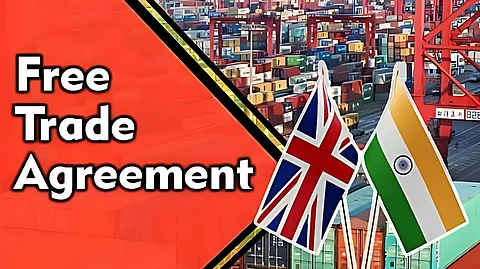

London | Business leaders and industry experts operating within the India-UK corridor on Thursday expressed enthusiasm around the FTA to be signed between Prime Minister Narendra Modi and his UK counterpart, Keir Starmer, significantly cutting tariff lines and regulatory processes across sectors.
While Starmer dubbed the deal as a “major win” for British companies, many expressed excitement at the prospects of a greater flow of goods and services that it would facilitate and present consumers with a greater choice of cheaper offers.
The UK's Department for Business and Trade (DBT) analysis of the Free Trade Agreement (FTA) indicates that India has cut over 90 per cent of its tariff lines, which combined with regulatory barriers being reduced, is expected to boost exports to India by nearly 60 per cent.
“As one of the leading producers of South Asian foods in the UK and Europe, we import a variety of agri food products from India such as pulses and lentils, spices, nuts, flours and rice,” said Rahul Kale, International Director of Vibrant Foods.
“We are excited about this landmark Free Trade Agreement between (the) UK and India as it will make trade between the two countries easier, boost job creation and encourage innovation.
"We are particularly looking forward to the sanitary and phytosanitary (SPS) alignment of food safety standards between the two countries, which will lead to reduction of export health certificates and reduce border checks and rejections on agri food products from India,” he said.
Shivalkar Paramanandam, UK-based Director of QDT Analytics, is involved in the area of export-import of products such as alcohol and food products.
“We are very excited because after the UK-India trade deal business dealing will become even easier for us. Before there was a 150 per cent tax (on alcohol imports to India), which will now be reduced and also a lot of documentation will be cut to a very straightforward process for us to do the exports and imports between the UK and India,” he said.
The deal, which is projected to double bilateral trade between both nations to USD 120 billion by 2030, has been dubbed the “biggest and most significant Free Trade Agreement” that the United Kingdom has signed since Brexit.
“I believe this historic agreement will act as a catalyst, turbocharging trade, investment and business partnerships between our two great nations. I am confident that we will see bilateral trade double to over GBP 80 billion within the next five years,” said Lord Karan Bilimoria, founder of Cobra Beer and co-chair of the India All Party Parliamentary Group (APPG).
“Prime Minister Modi's visit to the UK this week underscores the strength and strategic importance of this partnership. His presence for the signing of this deal is a powerful symbol of the deep trust and mutual respect between our countries. The UK and India are the best of friends, and we have the best of potential. This agreement is not just a milestone — it is a launchpad,” he said.
Manoj Ladwa, chair of India Global Forum (IGF) and founder of the UK India Future Forum, highlighted the sector-wide sweep of the FTA, heralding it as a chance to forge a “substantive partnership grounded in mutual ambition, global problem-solving, and future-facing sectors like AI, life sciences, green tech, and digital transformation".
“Since Brexit, successive UK governments have struggled to articulate a clear, compelling vision for Britain's role on the world stage. ‘Global Britain' remains more slogan than strategy. Modi's visit, and the FTA it underlines, provides a rare opportunity to change that,” he said.
The FTA, which was agreed on May 6, completes the formal legal scrubbing of text to be tabled in the British Parliament this week. A ratification process will now be initiated by the UK government before it can be enforced in the coming months.
